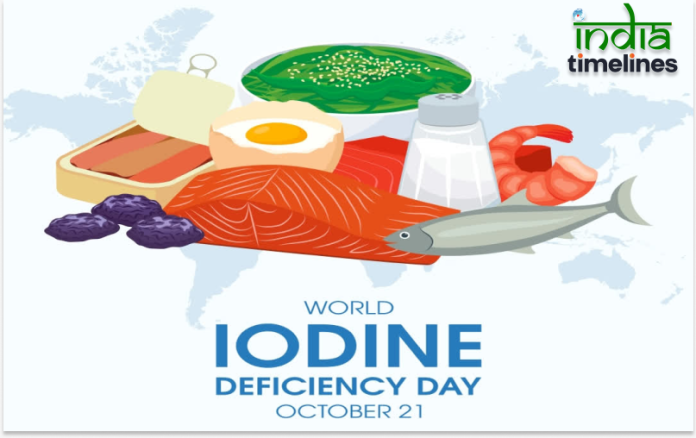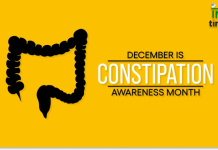
Every year on October 21st, the world marks World Iodine Deficiency Day, an important event dedicated to raising awareness about the global health implications of iodine deficiency. Despite being a preventable condition, millions of people across the world suffer from iodine deficiency, which can lead to severe health problems, especially in children and pregnant women.
As we observe World Iodine Deficiency Day 2024, it’s crucial to understand why iodine is essential, how deficiency impacts health, and what can be done to prevent this global health issue.
The Importance of Iodine
Iodine is a trace element that plays a critical role in maintaining thyroid health. The thyroid gland uses iodine to produce hormones that regulate metabolism, growth, and brain development. These hormones—thyroxine (T4) and triiodothyronine (T3)—are essential for overall body function. Without sufficient iodine, the thyroid cannot produce these hormones, leading to various health issues.
Why Is Iodine So Important?
- For Growth and Development: Iodine is vital for brain development, especially during pregnancy and early childhood.
- For Metabolism: It helps regulate metabolic processes in the body, ensuring that energy is produced and utilized efficiently.
- For Thyroid Health: It prevents disorders like goiter and hypothyroidism by ensuring proper thyroid hormone production.
Iodine Deficiency and Its Impact
Iodine deficiency occurs when there isn’t enough iodine in the diet. This can have serious health consequences, especially for women of reproductive age, pregnant women, and young children.
Key Health Effects of Iodine Deficiency
- Goiter: The most visible sign of iodine deficiency is goiter, which is the swelling of the thyroid gland. This occurs when the thyroid gland overworks to compensate for the lack of iodine.
- Hypothyroidism: A lack of iodine can cause the thyroid gland to produce too few hormones, leading to symptoms such as fatigue, weight gain, and depression.
- Cognitive Impairments in Children: Iodine deficiency during pregnancy and early childhood can lead to severe developmental delays and cognitive impairments. It is one of the leading causes of preventable intellectual disabilities.
- Increased Risk During Pregnancy: Iodine is crucial for fetal development. Pregnant women with iodine deficiency are at higher risk of miscarriage, stillbirth, and giving birth to babies with birth defects.
Global Prevalence of Iodine Deficiency
Iodine deficiency remains a public health issue in many parts of the world. According to the World Health Organization (WHO), approximately 30% of the world’s population is at risk of iodine deficiency, with over 2 billion people affected globally.
Regions Most Affected
- South Asia: Countries like India, Pakistan, and Bangladesh are among those with high rates of iodine deficiency due to limited access to iodized salt and iodine-rich foods.
- Sub-Saharan Africa: Many African nations continue to struggle with iodine deficiency due to poor infrastructure and lack of awareness.
- Eastern Europe: Although progress has been made, certain areas still report cases of iodine deficiency.
Combating Iodine Deficiency
The good news is that iodine deficiency can be prevented easily and affordably through the use of iodized salt and other public health interventions.
Iodized Salt: The Most Effective Solution
The universal iodization of salt has been the most successful method of preventing iodine deficiency globally. By fortifying salt with iodine, people can meet their daily iodine needs through a common household item. Universal Salt Iodization (USI) programs, launched by WHO and UNICEF, have significantly reduced iodine deficiency in many parts of the world.
Iodine-Rich Foods
In addition to iodized salt, incorporating iodine-rich foods into your diet is another effective way to prevent deficiency. Some natural sources of iodine include:
- Seaweed: One of the richest sources of iodine.
- Fish and Seafood: Particularly cod, tuna, and shrimp.
- Dairy Products: Milk, cheese, and yogurt.
- Eggs: A good source of iodine, especially in the yolk.
Supplements for High-Risk Groups
Pregnant women, breastfeeding mothers, and individuals in iodine-deficient regions may need iodine supplements to ensure they meet their daily iodine requirements. Health professionals recommend iodine supplements for women during pregnancy to support both maternal and fetal health.
World Iodine Deficiency Day 2024: Theme and Focus
The theme for World Iodine Deficiency Day 2024 is “Ending Iodine Deficiency Through Public Awareness and Global Action.” The focus is on educating communities about the importance of iodine and advocating for policies that promote the use of iodized salt. This year, health organizations and governments are coming together to emphasize the critical need for iodine-rich diets and public health initiatives that address iodine deficiency in vulnerable populations.
Educational Campaigns
Many countries are launching educational campaigns to raise awareness about the dangers of iodine deficiency and the importance of iodized salt. These campaigns often target rural and underserved populations where iodine deficiency is most prevalent.
Government Initiatives
Governments are encouraged to implement and enforce salt iodization policies. By making iodized salt available to all, countries can take significant steps toward eliminating iodine deficiency disorders (IDD).
The Future of Iodine Deficiency Prevention
While significant progress has been made, more work is needed to ensure that iodine deficiency becomes a thing of the past. Governments, health organizations, and communities must continue to work together to expand access to iodized salt and ensure that iodine-rich foods are part of daily diets.
Challenges Ahead
- Access to Iodized Salt: In many developing countries, iodized salt is either unavailable or too expensive for the general population. Efforts need to be made to improve access.
- Awareness and Education: Many people are unaware of the importance of iodine and the dangers of deficiency. Continued public health campaigns are needed to educate populations about the benefits of iodine.
- Policy Enforcement: While many countries have salt iodization policies, enforcement remains weak in some regions, leading to continued iodine deficiency.
India Time Lines
Conclusion
As we observe World Iodine Deficiency Day 2024, it’s important to remember that iodine deficiency is preventable. By promoting the use of iodized salt, encouraging the consumption of iodine-rich foods, and supporting public health campaigns, we can work toward a world where iodine deficiency is no longer a threat to global health. Let’s come together to raise awareness, educate our communities, and take action to ensure that no one suffers from the preventable effects of iodine deficiency.
FAQs
1. What are the symptoms of iodine deficiency?
The most common symptoms include swelling in the neck (goiter), fatigue, weight gain, and in severe cases, cognitive impairments and developmental delays.
2. How can I prevent iodine deficiency?
You can prevent iodine deficiency by using iodized salt in your cooking, eating iodine-rich foods like seafood and dairy products, and taking iodine supplements if recommended by a doctor.
3. Who is most at risk of iodine deficiency?
Pregnant women, children, and people living in areas with iodine-poor soils are at the highest risk of iodine deficiency.
4. How does iodine affect pregnancy?
Iodine is essential for fetal brain development. A deficiency during pregnancy can lead to miscarriage, stillbirth, and birth defects in the baby.
5. How much iodine do I need daily?
The recommended daily intake of iodine is 150 micrograms for adults, and 220-290 micrograms for pregnant and breastfeeding women.



































